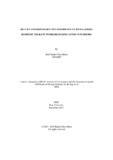| dc.contributor.advisor | Reza, Selim | |
| dc.contributor.author | Chowdhury, Akib Haider | |
| dc.date.accessioned | 2022-08-08T05:56:30Z | |
| dc.date.available | 2022-08-08T05:56:30Z | |
| dc.date.copyright | 2021 | |
| dc.date.issued | 2021-12 | |
| dc.identifier.other | ID 20162005 | |
| dc.identifier.uri | http://hdl.handle.net/10361/17070 | |
| dc.description | This thesis is submitted in partial fulfillment of the requirements for the degree of Masters of Development Studies, 2021. | en_US |
| dc.description | Cataloged from PDF version of thesis. | |
| dc.description | Includes bibliographical references (page 31). | |
| dc.description.abstract | Many Bangladeshi female domestic migrant workers working abroad returned home during the COVID-19 pandemic. There were many causes for the return of these migrant domestic women workers. Short-term and long-term challenges that these returnee women faces are still not thoroughly examined. This thesis is an attempt to examine how these migrant workers experienced their return and what were the key challenges in reintegrating them in Bangladesh. Empirical data has been collected from a total of 20 female migrant returnees through a structured questionnaire which included a total of 4 research questions that explored the main causes for their return, immediate and long-term challenges, types of reintegration measures introduced by the government, and the kind of assistance provided by NGO’s. In addition to these, a total of 4 Key Informant Interviews (KIIs) comprising of experts from this field were conducted. Empirical evidence shows that the causes for their return included the end of contracts, non-renewal of visas, business closures, violence and sexual assault etc. The immediate challenges that women returnees face is the need for psychosocial support in addition to challenges at the airport and complex documentation process. NGOs engaged in advocacy work, provision of psychosocial support, awareness raising campaigns etc. In terms of social acceptance, most of the returnee women have experienced various forms of mental abuse. The thesis argues that there are not enough policies in place to tackle these problems. | en_US |
| dc.description.statementofresponsibility | Akib Haider Chowdhury | |
| dc.format.extent | 31 pages | |
| dc.language.iso | en | en_US |
| dc.publisher | Brac University | en_US |
| dc.rights | Brac University theses are protected by copyright. They may be viewed from this source for any purpose, but reproduction or distribution in any format is prohibited without written permission. | |
| dc.subject | Covid-19 | en_US |
| dc.subject | Domestic migrant workers | en_US |
| dc.subject | Female migrant workers | en_US |
| dc.subject.lcsh | Women foreign workers. | |
| dc.subject.lcsh | Migrant labor. | |
| dc.title | Return and reintegration experience of Bangladeshi domestic migrant workers during Covid-19 pandemic | en_US |
| dc.type | Thesis | en_US |
| dc.contributor.department | BRAC Institute of Governance and Development, Brac University | |
| dc.description.degree | M. Development Studies | |

